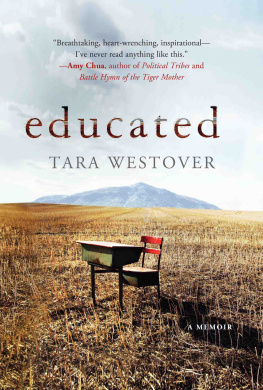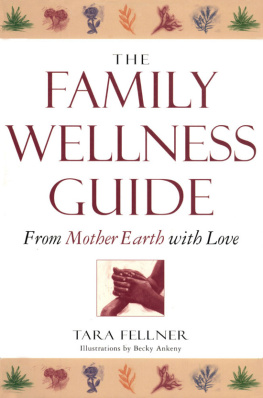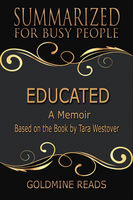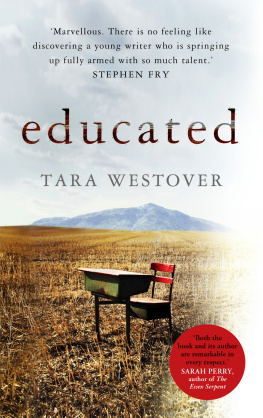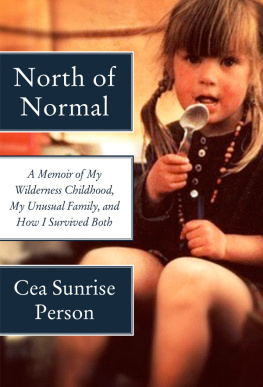The past is beautiful because one never realises an emotion at the time. It expands later, & thus we dont have complete emotions about the present, only about the past.
I believe finally, that education must be conceived as a continuing reconstruction of experience; that the process and the goal of education are one and the same thing.
I M STANDING ON THE RED RAILWAY CAR THAT SITS ABANDONED next to the barn. The wind soars, whipping my hair across my face and pushing a chill down the open neck of my shirt. The gales are strong this close to the mountain, as if the peak itself is exhaling. Down below, the valley is peaceful, undisturbed. Meanwhile our farm dances: the heavy conifer trees sway slowly, while the sagebrush and thistles quiver, bowing before every puff and pocket of air. Behind me a gentle hill slopes upward and stitches itself to the mountain base. If I look up, I can see the dark form of the Indian Princess.
The hill is paved with wild wheat. If the conifers and sagebrush are soloists, the wheat field is a corps de ballet, each stem following all the rest in bursts of movement, a million ballerinas bending, one after the other, as great gales dent their golden heads. The shape of that dent lasts only a moment, and is as close as anyone gets to seeing wind.
Turning toward our house on the hillside, I see movements of a different kind, tall shadows stiffly pushing through the currents. My brothers are awake, testing the weather. I imagine my mother at the stove, hovering over bran pancakes. I picture my father hunched by the back door, lacing his steel-toed boots and threading his callused hands into welding gloves. On the highway below, the school bus rolls past without stopping.
I am only seven, but I understand that it is this fact, more than any other, that makes my family different: we dont go to school.
Dad worries that the Government will force us to go but it cant, because it doesnt know about us. Four of my parents seven children dont have birth certificates. We have no medical records because we were born at home and have never seen a doctor or nurse. We have no school records because weve never set foot in a classroom. When I am nine, I will be issued a Delayed Certificate of Birth, but at this moment, according to the state of Idaho and the federal government, I do not exist.
Of course I did exist. I had grown up preparing for the Days of Abomination, watching for the sun to darken, for the moon to drip as if with blood. I spent my summers bottling peaches and my winters rotating supplies. When the World of Men failed, my family would continue on, unaffected.
I had been educated in the rhythms of the mountain, rhythms in which change was never fundamental, only cyclical. The same sun appeared each morning, swept over the valley and dropped behind the peak. The snows that fell in winter always melted in the spring. Our lives were a cyclethe cycle of the day, the cycle of the seasonscircles of perpetual change that, when complete, meant nothing had changed at all. I believed my family was a part of this immortal pattern, that we were, in some sense, eternal. But eternity belonged only to the mountain.
Theres a story my father used to tell about the peak. She was a grand old thing, a cathedral of a mountain. The range had other mountains, taller, more imposing, but Bucks Peak was the most finely crafted. Its base spanned a mile, its dark form swelling out of the earth and rising into a flawless spire. From a distance, you could see the impression of a womans body on the mountain face: her legs formed of huge ravines, her hair a spray of pines fanning over the northern ridge. Her stance was commanding, one leg thrust forward in a powerful movement, more stride than step.
My father called her the Indian Princess. She emerged each year when the snows began to melt, facing south, watching the buffalo return to the valley. Dad said the nomadic Indians had watched for her appearance as a sign of spring, a signal the mountain was thawing, winter was over, and it was time to come home.
All my fathers stories were about our mountain, our valley, our jagged little patch of Idaho. He never told me what to do if I left the mountain, if I crossed oceans and continents and found myself in strange terrain, where I could no longer search the horizon for the Princess. He never told me how Id know when it was time to come home.
M Y STRONGEST MEMORY IS NOT A MEMORY. I TS SOMETHING I imagined, then came to remember as if it had happened. The memory was formed when I was five, just before I turned six, from a story my father told in such detail that I and my brothers and sister had each conjured our own cinematic version, with gunfire and shouts. Mine had crickets. Thats the sound I hear as my family huddles in the kitchen, lights off, hiding from the Feds whove surrounded the house. A woman reaches for a glass of water and her silhouette is lighted by the moon. A shot echoes like the lash of a whip and she falls. In my memory its always Mother who falls, and she has a baby in her arms.
The baby doesnt make senseIm the youngest of my mothers seven childrenbut like I said, none of this happened.
A YEAR AFTER MY FATHER told us that story, we gathered one evening to hear him read aloud from Isaiah, a prophecy about Immanuel. He sat on our mustard-colored sofa, a large Bible open in his lap. Mother was next to him. The rest of us were strewn across the shaggy brown carpet.
Butter and honey shall he eat, Dad droned, low and monotone, weary from a long day hauling scrap. That he may know to refuse the evil, and choose the good.
There was a heavy pause. We sat quietly.
My father was not a tall man but he was able to command a room. He had a presence about him, the solemnity of an oracle. His hands were thick and leatherythe hands of a man whod been hard at work all his lifeand they grasped the Bible firmly.
He read the passage aloud a second time, then a third, then a fourth. With each repetition the pitch of his voice climbed higher. His eyes, which moments before had been swollen with fatigue, were now wide and alert. There was a divine doctrine here, he said. He would inquire of the Lord.
The next morning Dad purged our fridge of milk, yogurt and cheese, and that evening when he came home, his truck was loaded with fifty gallons of honey.
Isaiah doesnt say which is evil, butter or honey, Dad said, grinning as my brothers lugged the white tubs to the basement. But if you ask, the Lord will tell you!
When Dad read the verse to his mother, she laughed in his face. I got some pennies in my purse, she said. You better take them. Theyll be all the sense you got.
Grandma had a thin, angular face and an endless store of faux Indian jewelry, all silver and turquoise, which hung in clumps from her spindly neck and fingers. Because she lived down the hill from us, near the highway, we called her Grandma-down-the-hill. This was to distinguish her from our mothers mother, who we called Grandma-over-in-town because she lived fifteen miles south, in the only town in the county, which had a single stoplight and a grocery store.
Dad and his mother got along like two cats with their tails tied together. They could talk for a week and not agree about anything, but they were tethered by their devotion to the mountain. My fathers family had been living at the base of Bucks Peak for half a century. Grandmas daughters had married and moved away, but my father stayed, building a shabby yellow house, which he would never quite finish, just up the hill from his mothers, at the base of the mountain, and plunking a junkyardone of severalnext to her manicured lawn.

